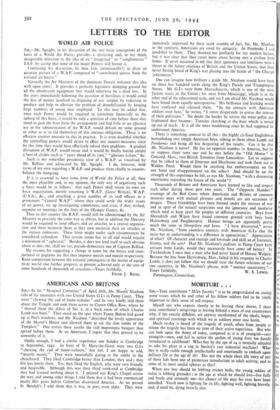AMERICANS AND BRITONS
Sta,—In his " Marginal Comment " of April 28th, Mr. Harold Nicolson tells of his encounter with two United States G.I.s in Pump Court. They were " chewing the cud of home-sickness " and he very kindly told them about the Temple and took them across to Crown Office Row, where he " showed them the debris of No. 2, in a back room of which Charles Lamb was born." They stood on the spot where Fanny Bolton had gazed up at Pen's windows, and Mr. Nicolson " described the lovely appearance of the Master's House and allowed them to see the dim tombs of the Templars." One envies these youths the rich impromptu banquet thus spread before them. As an American, I regret that they proved to be unworthy of it.
Oddly enough, I had a similar experience one Sunday at Cambridge in September, 1942. In front of St. Mary-the-Great were two G.I.s " chewing the cud of home-sickness," but not, I am happy to add, "beastly mastic." They were mournfully gazing at the tombs in the churchyard. They liked Cambridge better than London, they said ; they felt less lonely there. Yes, they liked the English, who were very friendly and hospitable. Although this was their third week-end at Cambridge they had learned nothing about it. I pointed out King's Chapel across the way, and among other things I told them that it had been commenced nearly fifty years before Columbus discovered America. As we passed St. Botolph's I told them that it was, in part, even older. They were
immensely impressed by these stark crumbs of fact, for, Mr. Nicolson to the contrary, Americans are awed by antiquity. At Pembroke I said good-bye to them. They thanked me profusely for my modest lecture, but it was clear that they cared more about having met a civilian from home. It never occurred to rnt that their ignorance and loneliness were a threat to the future relations of Britain and the United States, that their never having heard of King's was playing into the hands of " the Chicago isolationists."
One can imagine how brilliant a guide Mr. Nicolson would have been on those few hundred yards along the King's Parade and Trumpington Street. My G.I.s were from Massachusetts, which is one of the most literate states in the Union ; his were from Mississippi, which is at the other end of the educational scale, and yet I am afraid Mr. Nicolson would have found them equally unresponsive. His brilliance and learning would have confused and silenced them. " In my contacts with American soldiers over here," he writes, " I strive desperately to pierce the armour of their politeness." No doubt the harder he strives the more polite and frightened they become: Tantalus clutching at the fruit which is tossed up out of reach. It is all the more maddening since he had supposed he understood America.
There is something comical in all this: the highly civilised Englishman buttonholing two simple American boys, talking to them about Lamb and Pendennis and being all but despairing of the results. Can it be that Mr. Nicolson is naive? He has no opposite number in America, but let us suppose there were one and he met before the "Old Manse " in Concord, Mass., two British Tommies from Lancashire. Let us suppose that he talked to them of Emerson and Haythorne and took them out to Walden Pond. Would there be anything but embarrassment on the one hand and disappointment on the other? And should he on the strength of this experience be left, as was Mr. Nicolson, " with a distressing uncertainty regarding the future of the world "?
Thousands of Britons and Americans have learned to like and respect each other during these past two years. The "Opposite Number evenings of the Red Cross where Americans and Britons of common interests meet with mutual pleasure and benefit are not occasions of despair. These friendships have been formed under the stresses of war and in spite of the natural suspicions and the ignorance and insularity which tend to keep apart the peoples of different countries. Boys from Shoreditch and Wigan have found common ground with boys from Hattiesburg and Poughkeepsie. Human beings are apparently pretty much the same in Shropshire and Iowa. " I have discovered," writes Mr. Nicolson, " from countless contacts with American G.I.s that the main bar to understanding is a difference in appreciation." Appreciation of what? Of character and courage and fortitude and skill, or of literature, history, and the arts? Had Mr. Nicolson's auditors in Pump Court been artisans from Leeds, would they necessarily have come off better? In Twickenham I once met a man who had never heard of Horace Walpole. Because the boy from Hattiesburg, Miss., failed in his response to Charles Lamb, it does not follow that we should view the future relations of our two countries, in Mr. Nicolson's phrase, with " anxious uncertainty."—






























 Previous page
Previous page